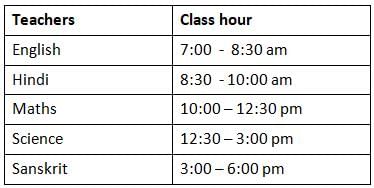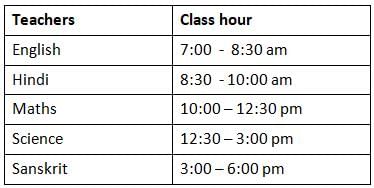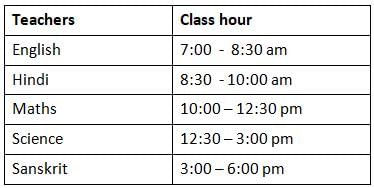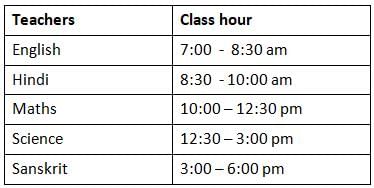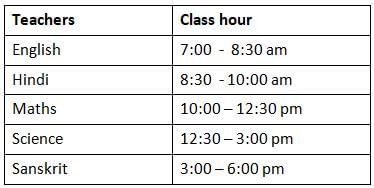MCQ: Tabulation - 1 - SSC CGL MCQ
15 Questions MCQ Test General Intelligence and Reasoning for SSC CGL - MCQ: Tabulation - 1
Directions: Study the following information carefully and answer the question given below:
In a group, 5 friends Amit, Akash, Ashu, Avdesh and Veenit have an exclusive and different preference for a colour, a bike, and a Watch. Colour preferences are Red, Pink, Green, Grey and Blue. Bikes preferences are Karizma, Pulsar, Passion, Discover and Splendor. Watch preferences are Timex, Titan, Fastrack, Citizen and Samay. But not necessary in the same order.
Amit like Discover and Red colour but does not prefer Titan and Fastrack. The one who has Pulsar prefer Fastrack. Ashu has preference for splendor, Blue colour and Samay. Avdesh has preference for Pink colour and Timex. Veenit prefers Karizma and Grey.
Q. Which colour does Amit like?
Directions: Study the following information carefully and answer the question given below:
In a group, 5 friends Amit, Akash, Ashu, Avdesh and Veenit have an exclusive and different preference for a colour, a bike, and a Watch. Colour preferences are Red, Pink, Green, Grey and Blue. Bikes preferences are Karizma, Pulsar, Passion, Discover and Splendor. Watch preferences are Timex, Titan, Fastrack, Citizen and Samay. But not necessary in the same order.
Amit like Discover and Red colour but does not prefer Titan and Fastrack. The one who has Pulsar prefer Fastrack. Ashu has preference for splendor, Blue colour and Samay. Avdesh has preference for Pink colour and Timex. Veenit prefers Karizma and Grey.
Q. Which watch is Amit‘s preference?
Directions: Study the following information carefully and answer the question given below:
In a group, 5 friends Amit, Akash, Ashu, Avdesh and Veenit have an exclusive and different preference for a colour, a bike, and a Watch. Colour preferences are Red, Pink, Green, Grey and Blue. Bikes preferences are Karizma, Pulsar, Passion, Discover and Splendor. Watch preferences are Timex, Titan, Fastrack, Citizen and Samay. But not necessary in the same order.
Amit like Discover and Red colour but does not prefer Titan and Fastrack. The one who has Pulsar prefer Fastrack. Ashu has preference for splendor, Blue colour and Samay. Avdesh has preference for Pink colour and Timex. Veenit prefers Karizma and Grey.
Q. Which colour does Ashu like?
Directions: Study the following information carefully and answer the question given below:
In a group, 5 friends Amit, Akash, Ashu, Avdesh and Veenit have an exclusive and different preference for a colour, a bike, and a Watch. Colour preferences are Red, Pink, Green, Grey and Blue. Bikes preferences are Karizma, Pulsar, Passion, Discover and Splendor. Watch preferences are Timex, Titan, Fastrack, Citizen and Samay. But not necessary in the same order.
Amit like Discover and Red colour but does not prefer Titan and Fastrack. The one who has Pulsar prefer Fastrack. Ashu has preference for splendor, Blue colour and Samay. Avdesh has preference for Pink colour and Timex. Veenit prefers Karizma and Grey.
Q. Whose preference is Karizma?
Directions: Study the following information carefully and answer the question given below:
In a group, 5 friends Amit, Akash, Ashu, Avdesh and Veenit have an exclusive and different preference for a colour, a bike, and a Watch. Colour preferences are Red, Pink, Green, Grey and Blue. Bikes preferences are Karizma, Pulsar, Passion, Discover and Splendor. Watch preferences are Timex, Titan, Fastrack, Citizen and Samay. But not necessary in the same order.
Amit like Discover and Red colour but does not prefer Titan and Fastrack. The one who has Pulsar prefer Fastrack. Ashu has preference for splendor, Blue colour and Samay. Avdesh has preference for Pink colour and Timex. Veenit prefers Karizma and Grey.
Q. Whose preference is Pulsar?
Directions: Study the following information carefully and answer the question given below.
There are five teachers of different subjects viz., English, Hindi, Science, Maths and Sanskrit who take class but not necessarily in the same order. They take class at different timing in a single day. The duration of their class is different. The total duration of the class by all teachers is of 11 hours. There is no gap between the class time of all teachers. The duration of class either full hour or half an hour but not in one third or one fourth. Only one teacher takes class of one subject and only one class of each subject is held in a day.
The timing of class of the teacher who takes class of maths is 10:00 to 12:30 am. The teacher of science takes class just after the class of maths. The duration of class of Sanskrit class is 3 hours. The class of English and the class of Hindi are not taken by any teacher after the class of Science. The class of science is not the last in all classes. The timing of class of English is 7:00 to 8:30 am. The duration of science class is 1 hour more than the duration of class of Hindi.
Q. Who among the following subject teacher takes class just after the Sanskrit teacher?
Directions: Study the following information carefully and answer the question given below.
There are five teachers of different subjects viz., English, Hindi, Science, Maths and Sanskrit who take class but not necessarily in the same order. They take class at different timing in a single day. The duration of their class is different. The total duration of the class by all teachers is of 11 hours. There is no gap between the class time of all teachers. The duration of class either full hour or half an hour but not in one third or one fourth. Only one teacher takes class of one subject and only one class of each subject is held in a day.
The timing of class of the teacher who takes class of maths is 10:00 to 12:30 am. The teacher of science takes class just after the class of maths. The duration of class of Sanskrit class is 3 hours. The class of English and the class of Hindi are not taken by any teacher after the class of Science. The class of science is not the last in all classes. The timing of class of English is 7:00 to 8:30 am. The duration of science class is 1 hour more than the duration of class of Hindi.
Q. Who among the following subject teacher takes class at first?
Directions: Study the following information carefully and answer the question given below.
There are five teachers of different subjects viz., English, Hindi, Science, Maths and Sanskrit who take class but not necessarily in the same order. They take class at different timing in a single day. The duration of their class is different. The total duration of the class by all teachers is of 11 hours. There is no gap between the class time of all teachers. The duration of class either full hour or half an hour but not in one third or one fourth. Only one teacher takes class of one subject and only one class of each subject is held in a day.
The timing of class of the teacher who takes class of maths is 10:00 to 12:30 am. The teacher of science takes class just after the class of maths. The duration of class of Sanskrit class is 3 hours. The class of English and the class of Hindi are not taken by any teacher after the class of Science. The class of science is not the last in all classes. The timing of class of English is 7:00 to 8:30 am. The duration of science class is 1 hour more than the duration of class of Hindi.
Q. Who among the following subject teacher takes class 8:30-10:00 am?
Directions: Study the following information carefully and answer the question given below.
There are five teachers of different subjects viz., English, Hindi, Science, Maths and Sanskrit who take class but not necessarily in the same order. They take class at different timing in a single day. The duration of their class is different. The total duration of the class by all teachers is of 11 hours. There is no gap between the class time of all teachers. The duration of class either full hour or half an hour but not in one third or one fourth. Only one teacher takes class of one subject and only one class of each subject is held in a day.
The timing of class of the teacher who takes class of maths is 10:00 to 12:30 am. The teacher of science takes class just after the class of maths. The duration of class of Sanskrit class is 3 hours. The class of English and the class of Hindi are not taken by any teacher after the class of Science. The class of science is not the last in all classes. The timing of class of English is 7:00 to 8:30 am. The duration of science class is 1 hour more than the duration of class of Hindi.
Q. What is the duration (in hours) of the class of science class?
Directions: Study the following information carefully and answer the question given below.
There are five teachers of different subjects viz., English, Hindi, Science, Maths and Sanskrit who take class but not necessarily in the same order. They take class at different timing in a single day. The duration of their class is different. The total duration of the class by all teachers is of 11 hours. There is no gap between the class time of all teachers. The duration of class either full hour or half an hour but not in one third or one fourth. Only one teacher takes class of one subject and only one class of each subject is held in a day.
The timing of class of the teacher who takes class of maths is 10:00 to 12:30 am. The teacher of science takes class just after the class of maths. The duration of class of Sanskrit class is 3 hours. The class of English and the class of Hindi are not taken by any teacher after the class of Science. The class of science is not the last in all classes. The timing of class of English is 7:00 to 8:30 am. The duration of science class is 1 hour more than the duration of class of Hindi.
Q. What is the duration (in hours) of the class of Hindi class?
Directions: Study the following information carefully and answer the question given below.
In a factory, 6 workers L, M, N, O, P and Q work in 6 different time shift 9 am to 3 pm (each shift is of one hour). Each one earns different amount per day Rs 200, Rs 300, Rs 400, Rs 500, Rs 600 and Rs 700.
O’s shift time is before 1pm and his salary is not Rs 300 and Rs 500. P earns more than N by Rs 300 but his shift time is not 11 am and 2 pm. L earns Rs 400 and his shift time is on or after 12 noon. The person who earns least amount is not Q or M while he works in shift of 10 am to 11am. The person who earns highest salary neither work at 9 am nor at 2 pm. M’s shift time is 1 pm to 2 pm. The difference between the salary of Q and L is Rs 200. Neither P’s nor Q’s shift time is 12 noon. The person whose shift time is 11 am to 12 noon earns Rs 600.
Q. What is the salary difference between the amount of N and O?
Directions: Study the following information carefully and answer the question given below.
In a factory, 6 workers L, M, N, O, P and Q work in 6 different time shift 9 am to 3 pm (each shift is of one hour). Each one earns different amount per day Rs 200, Rs 300, Rs 400, Rs 500, Rs 600 and Rs 700.
O’s shift time is before 1pm and his salary is not Rs 300 and Rs 500. P earns more than N by Rs 300 but his shift time is not 11 am and 2 pm. L earns Rs 400 and his shift time is on or after 12 noon. The person who earns least amount is not Q or M while he works in shift of 10 am to 11am. The person who earns highest salary neither work at 9 am nor at 2 pm. M’s shift time is 1 pm to 2 pm. The difference between the salary of Q and L is Rs 200. Neither P’s nor Q’s shift time is 12 noon. The person whose shift time is 11 am to 12 noon earns Rs 600.
Q. Who earns the most among them?
Directions: Study the following information carefully and answer the question given below.
In a factory, 6 workers L, M, N, O, P and Q work in 6 different time shift 9 am to 3 pm (each shift is of one hour). Each one earns different amount per day Rs 200, Rs 300, Rs 400, Rs 500, Rs 600 and Rs 700.
O’s shift time is before 1pm and his salary is not Rs 300 and Rs 500. P earns more than N by Rs 300 but his shift time is not 11 am and 2 pm. L earns Rs 400 and his shift time is on or after 12 noon. The person who earns least amount is not Q or M while he works in shift of 10 am to 11am. The person who earns highest salary neither work at 9 am nor at 2 pm. M’s shift time is 1 pm to 2 pm. The difference between the salary of Q and L is Rs 200. Neither P’s nor Q’s shift time is 12 noon. The person whose shift time is 11 am to 12 noon earns Rs 600.
Q. Who works in the shift time of 2 pm to 3 pm?
Directions: Study the following information carefully and answer the question given below.
In a factory, 6 workers L, M, N, O, P and Q work in 6 different time shift 9 am to 3 pm (each shift is of one hour). Each one earns different amount per day Rs 200, Rs 300, Rs 400, Rs 500, Rs 600 and Rs 700.
O’s shift time is before 1pm and his salary is not Rs 300 and Rs 500. P earns more than N by Rs 300 but his shift time is not 11 am and 2 pm. L earns Rs 400 and his shift time is on or after 12 noon. The person who earns least amount is not Q or M while he works in shift of 10 am to 11am. The person who earns highest salary neither work at 9 am nor at 2 pm. M’s shift time is 1 pm to 2 pm. The difference between the salary of Q and L is Rs 200. Neither P’s nor Q’s shift time is 12 noon. The person whose shift time is 11 am to 12 noon earns Rs 600.
Q. What is the amount earned by Q?
Directions: Study the following information carefully and answer the question given below.
In a factory, 6 workers L, M, N, O, P and Q work in 6 different time shift 9 am to 3 pm (each shift is of one hour). Each one earns different amount per day Rs 200, Rs 300, Rs 400, Rs 500, Rs 600 and Rs 700.
O’s shift time is before 1pm and his salary is not Rs 300 and Rs 500. P earns more than N by Rs 300 but his shift time is not 11 am and 2 pm. L earns Rs 400 and his shift time is on or after 12 noon. The person who earns least amount is not Q or M while he works in shift of 10 am to 11am. The person who earns highest salary neither work at 9 am nor at 2 pm. M’s shift time is 1 pm to 2 pm. The difference between the salary of Q and L is Rs 200. Neither P’s nor Q’s shift time is 12 noon. The person whose shift time is 11 am to 12 noon earns Rs 600.
Q. Who works in the first shift time?
|
201 videos|232 docs|197 tests
|
|
201 videos|232 docs|197 tests
|








